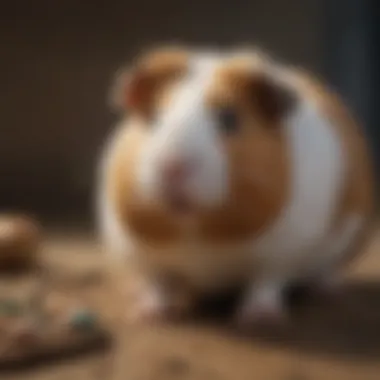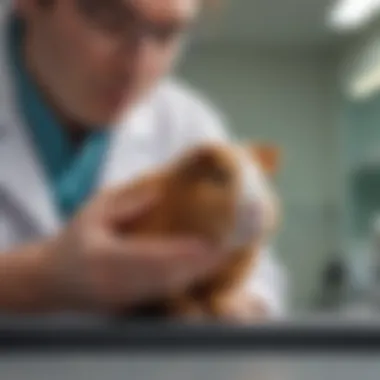Emergency Vet Care for Guinea Pigs: A Comprehensive Guide


Intro
Guinea pigs are unique pets that require specific care and attentiveness. Understanding their behaviors, needs, and health concerns is essential for any owner. This guide serves to provide a thorough insight into emergency veterinary care for these small animals. It emphasizes the importance of being prepared for possible emergencies, recognizing signs of illnesses, and knowing when to seek professional help.
Understanding Your Pet
Pet Behavior Basics
Guinea pigs are social creatures that thrive in an interactive environment. Their behavior can often indicate their well-being. For example, when a guinea pig is healthy, it will be active and engaging. Conversely, signs of lethargy, hiding, or abnormal vocalizations may indicate distress.
Common Breed Characteristics
Different breeds of guinea pigs exhibit various characteristics. For instance, the Abyssinian breed is known for its rosettes of fur, while the American breed has a smooth coat. Understanding these differences can help owners recognize when something is off with their pet, aiding in quicker intervention if needed.
Species-Specific Needs
Guinea pigs have specific dietary and environmental needs. They must have a high-fiber diet primarily made up of hay, alongside fresh vegetables and pellets formulated for their species. Temperature and humidity levels in their living space also need regular monitoring to prevent illness.
Health and Wellness
Routine Vet Check-ups
Regular veterinary visits are critical for maintaining guinea pig health. These check-ups allow for early detection of potential health issues. A vet can also offer advice tailored to the specific needs of your pet.
Vaccination Needs
Although guinea pigs do not require vaccinations in the same manner as dogs or cats, they can benefit from preventive treatments and regular check-ups for managing parasites.
Recognizing Signs of Illness
Familiarity with behavioral changes is vital for owners. Signs of illness can include a lack of appetite, abnormal droppings, or excessive vocalization. Understanding these signs and acting promptly can save a guinea pig's life.
Always consult your veterinarian if you notice any unusual behavior in your guinea pig. Early intervention can make a significant difference in treatment outcomes.
Pet Care and Maintenance
Feeding Guidelines
A balanced diet is crucial for guinea pigs. Providing unlimited access to quality hay is essential. Fresh vegetables should be introduced daily while pellets should be measured to prevent obesity. Avoid feeding them iceberg lettuce as it lacks nutritional value.
Grooming Essentials
Regular grooming helps maintain a guinea pig's coat health. Longhaired breeds need more frequent grooming to prevent mats. Regularly checking their nails is also essential, as overgrown nails can cause pain and walking difficulties.
Hygiene Practices
Keeping their living space clean is crucial. Change bedding regularly and check for any signs of waste or mold. This ensures a healthier environment, reducing the risk of infections.
Enrichment and Activities
Indoor vs.
Outdoor Activities
Guinea pigs benefit from a range of activities. Indoor areas should provide space to run and explore. Outdoor areas can offer fresh air and grass but always ensure they are secure from predators.
Interactive Toys and Games
Encouraging play with safe toys can stimulate your guinea pig’s mind. Chew toys made from untreated wood or cardboard boxes can provide entertainment and also help with teeth maintenance.
Socialization Opportunities
Social interaction is vital. Having more than one guinea pig can help them thrive. Ensure they are introduced properly to minimize stress and potential fighting.
Understanding Guinea Pig Health
Guinea pigs are delicate creatures that require specific care to maintain good health. Understanding their health is crucial for pet owners not only to provide basic care but also to recognize when something is wrong. Knowledge of common health issues, the signs of distress, and proper care can prevent minor issues from escalating into emergencies. It prepares owners to act quickly and effectively, which is vital, as guinea pigs can deteriorate rapidly without prompt veterinary attention.
Common Health Issues


Respiratory Infections
Respiratory infections are among the most common health issues affecting guinea pigs. These infections can be caused by bacteria, viruses, or environmental factors such as poor bedding and lack of ventilation. The key characteristic of respiratory infections is lethargy and labored breathing, which can become serious if not addressed promptly. This condition is beneficial to mention in this guide because it highlights the importance of clean environments and regular veterinary check-ups. Early detection can lead to better outcomes.
Gastrointestinal Stasis
Gastrointestinal stasis is a condition where the digestive system slows down or stops altogether. This issue commonly arises from a lack of fiber in the diet or stress. The key feature of gastrointestinal stasis is reduced or absent fecal output. It is crucial to discuss this condition since it can lead to severe complications if left untreated. Prompt treatment is essential for restoring normal gut function.
Urinary Tract Problems
Urinary tract problems are another concern for guinea pigs. These can range from infections to bladder stones. A key symptom of urinary tract issues is straining to urinate, which can cause pain and distress to the animal. Understanding this condition is essential as it can lead to severe health issues if ignored. Addressing these concerns quickly adds to the overall well-being of your guinea pig.
Skin Conditions
Skin conditions such as mites, fungal infections, and allergies can significantly impact a guinea pig’s health. A notable aspect of these conditions is itching and hair loss. It is beneficial to discuss skin conditions as they often lead to secondary infections if not treated. Prompt treatment can alleviate discomfort and promote healing, thus improving overall health.
Signs of Distress
Behavioral Changes
Behavioral changes in guinea pigs can indicate health issues. These might include hiding more often, a decrease in social interactions, or aggression. The notable aspect here is that guinea pigs are social animals; any change in behavior can suggest distress. Monitoring behavior helps in recognizing potential health issues early on, which is beneficial for ensuring their well-being.
Physical Symptoms
Physical symptoms such as runny noses, weight loss, and fur loss are indicators of distress. A key feature to note is that physical symptoms often precede critical health declines. Identifying these symptoms can lead to earlier interventions and improve the prognosis significantly. It highlights the importance of regular physical examinations.
Changes in Eating Habits
Changes in eating habits can be a sign of various health problems. A loss of appetite or changes in food preferences should raise concern. The crucial aspect here is that guinea pigs rely on a consistent diet for proper health. Recognizing these changes can alert owners to potential underlining issues, promoting timely veterinary care, which is essential for a healthy pet.
When to Seek Emergency Care
Recognizing when to seek emergency care for your guinea pig is vital to ensuring their health and welfare. Understanding this topic guides pet owners to make timely decisions that could save their pet's life. Guinea pigs are small creatures with delicate systems, making them vulnerable to rapid declines in health. Knowledge of medical emergencies, signs of pain, and behaviors requiring urgent attention can enhance prompt response and treatment.
Identifying Medical Emergencies
Severe Injury
Severe injury in guinea pigs can manifest in many forms, such as fractures, deep lacerations, or trauma from falls. These injuries often result from accidents or encounters with other pets. A key characteristic of severe injury is visible blood or swelling, suggesting significant damage. Addressing these issues is crucial, as untreated injuries can lead to infections or long-term complications.
A unique feature of severe injuries is their immediate impact on the guinea pig’s ability to move and function. This can complicate care since any movement can exacerbate the injury, leading to increased pain and suffering.
Signs of Pain
Recognizing signs of pain in a guinea pig is crucial for pet owners. They might exhibit behaviors like hiding, vocalizations, or aggression. A key characteristic of signs of pain is a change in normal behavior. Any deviation from their usual activity level should raise concern.
These signs can sometimes be subtle, which makes monitoring essential. The unique aspect of recognizing pain is the ability to prevent worsening conditions. Pain management can significantly improve a guinea pig's quality of life, making awareness vital.
Sudden Weight Loss
Sudden weight loss is often an indicator of underlying health issues such as dental problems or gastrointestinal distress. The contribution of sudden weight loss to the overall health of a guinea pig cannot be overstated. Weight fluctuations can signal serious conditions that require immediate evaluation.
The key characteristic here is the abrupt nature of the change. It can often indicate that a problem has reached a critical point. Unique to this issue is that timely intervention can alleviate further complications, making it a concern that shouldn't be ignored.
Urgency of Treatment
Impact of Time on Recovery
Time is a crucial factor in the recovery of guinea pigs from medical emergencies. Delayed treatment can worsen underlying health problems and lower the chances of successful recovery. The impact of time on recovery highlights the importance of prompt intervention, particularly for conditions that can deteriorate rapidly.
A notable characteristic of this urgency is the quick progression of certain illnesses. Some concerns, like gastrointestinal stasis, require immediate veterinary action to avoid severe consequences. The unique aspect of timing in veterinary care is that every moment matters, making prompt decisions essential for positive outcomes.
Importance of Immediate Care
Immediate care is often necessary for guinea pigs facing emergencies. Addressing health issues without delay can prevent complications and support better recovery outcomes. The importance of immediate care is underlined by the fact that many issues can escalate quickly, leading to severe health risks.
A key trait of emergency care is its responsiveness to critical situations. The unique feature here is that aquiring immediate veterinary support can make a significant difference in treatment effectiveness and recovery time. Being aware of the need for swift care can prepare pet owners to act decisively in emergencies.
In summary, understanding when to seek emergency care for guinea pigs is an essential skill for any pet owner. Quick identification of medical emergencies and the importance of immediate treatment can substantially influence your pet’s health outcomes.
Choosing an Emergency Vet


Choosing the right emergency veterinarian for your guinea pig is crucial. When an emergency arises, time is of essence, and having a suitable vet can make a significant difference in your pet's outcome. The process of selecting a vet should not be rushed. Understanding certain key factors can lead to informed decisions that prioritize your guinea pig’s health.
Finding a Qualified Vet
Checking Credentials
The first step in finding a suitable vet involves checking their credentials. This means verifying their educational background, licenses, and certifications specific to veterinary medicine. It is important because this ensures that the vet has the necessary training to treat your guinea pig.
A well-qualified vet may hold certifications from reputable organizations, like the American Veterinary Medical Association. This is a key characteristic because it signifies a commitment to continuous education and high professional standards. Ensure to do proper research, as a clear understanding of their qualifications instills trust.
Moreover, notable credentials can also indicate expertise in exotic animals, including guinea pigs. The advantage is that a qualified vet is more likely to possess the knowledge required to deal with specific health issues that affect guinea pigs.
Experience with Exotic Pets
Experience with exotic pets is another vital consideration while selecting an emergency vet. Regular veterinarians may not always be well-equipped or knowledgeable about treating guinea pigs. Thus, finding a vet who specializes in exotic animals is essential.
A vet experienced in this area will be familiar with common health issues related to guinea pigs. This characteristic heightens the likelihood of accurate diagnosis and effective treatment. Such experience is particularly beneficial in emergencies where quick, informed actions are necessary for recovery.
Additionally, a vet who regularly deals with exotic pets may have developed specific techniques for handling them safely. This feature presents a clear advantage, as it can reduce stress for your pet during consultations or emergency situations.
Recommendations and Reviews
Recommendations and reviews serve as important resources when seeking an emergency vet. First-hand experiences from other pet owners can provide insight into a vet’s capability and service quality. Relying on community feedback is a beneficial approach, as it reflects the vet’s reliability.
A key characteristic of utilizing recommendations is the ability to understand the vet's strengths and weaknesses from others’ perspectives. Engaging with local pet owners or online communities, like on Reddit, can prove invaluable for gathering insights. This method adds a layer of assurance when making your choice.
Furthermore, online reviews can help find areas of expertise that a vet may possess, such as dealing with specific illnesses prevalent in guinea pigs. While reviews can have disadvantages — they can sometimes be subjective or biased — balancing multiple opinions can lead to a more rounded view of potential candidates.
Emergency Vet Services
/ Availability
Emergencies do not follow a schedule, so the availability of emergency vet services is crucial. A 24/7 emergency vet ensures that you can access care at any hour. The significance of this service cannot be overstated; timely response can often be the difference between life and death.
The key characteristic of 24/7 availability is peace of mind. You know that help is just a call away, no matter the time. This can be a major advantage for pet owners who work unusual hours or have other obligations. Just knowing there is always a vet available can alleviate anxiety during a crisis.
However, not all emergency vet facilities operate at the same level. It is important to ensure that the vet available is experienced and equipped to handle emergencies, even during odd hours.
Specialized Equipment
Specialized equipment in an emergency vet clinic can vastly improve the quality of care your guinea pig receives. Facilities equipped with diagnostic tools specifically tailored for small and exotic animals offer a clear advantage.
This aspect is beneficial as advanced equipment can lead to quicker diagnosis and treatment options. For example, specialized imaging tools may help in identifying internal issues that are not visible through external examination. Such resources become crucial in emergency situations where every minute counts.
On the downside, not every emergency clinic may have the specialized equipment required for guinea pigs. This limitation can delay required interventions and worsen your pet’s condition. Therefore, verify the available resources before choosing a clinic.
Critical Care Options
The availability of critical care options is another significant element to consider. When guinea pigs face life-threatening situations, advanced critical care options can be crucial for survival.
A clinic that offers critical care is characterized by having trained personnel and infrastructure capable of intensive monitoring and treatment. This is essential as it ensures that your guinea pig receives high-quality care when it is most needed.
Moreover, the unique feature of having diverse critical care options can include a range of treatments from emergency surgery to intensive postoperative care. While these options can be incredibly beneficial, it’s also important to be aware of the associated costs, which can be a disadvantage in some cases. Thus, understanding potential expenses beforehand can help in planning for the unexpected.
Preparing for Emergencies
Preparing for emergencies is critical for guinea pig owners. While these pets can be robust, they are not immune to health issues. Having a plan in place can be the difference between life and death. An emergency can occur at any moment, sometimes without warning. Thus, understanding how to prepare promotes better outcomes during crises.
A well-prepared pet owner knows they can handle various situations effectively. This includes knowing what supplies are essential, how to respond during an emergency, and having access to veterinary services. These steps can significantly reduce stress for both the pet and the owner.
Creating an Emergency Kit
An emergency kit serves as a cornerstone of preparedness. It should contain all necessary items to respond swiftly when the need arises.
Essential Supplies
Essential supplies in an emergency kit include items that can help stabilize the guinea pig until veterinary help is available. This may include:
- Basic first-aid items: Bandages, antiseptic wipes, and tweezers for foreign object removal.
- Feeding necessities: A supply of their regular diet and hydration options.
- Comfort items: A blanket or familiar toy can help soothe the guinea pig.
These items are key because swift access can aid in prompt care. However, owners should ensure they know how to use these supplies since improper usage can lead to complications.


Medical Records
Keeping current medical records is another vital aspect of emergency preparation. This documentation should include:
- Previous illnesses or surgeries, which can provide insights to the vet.
- Vaccination history, ensuring that the pet is up to date on necessary shots.
- Medication lists, if applicable, to inform any emergency treatments.
Having these records on hand enables a smoother process at the vet's office. It also saves time, which may be crucial in a true emergency setting.
Contact Information
Contact information is essential for emergencies. Pet owners should compile a list including:
- Veterinary office numbers, both primary and emergency.
- Poison control helplines that specialize in pets.
- Nearest emergency animal clinics for after-hours situations.
Keeping this information visible and accessible is beneficial. It can alleviate panic and confusion during stressful moments, ensuring swift action for the pet’s care.
Emergency Procedures
It is equally important to be familiar with emergency procedures. Knowing how to react in a crisis can improve outcomes significantly.
Knowing When to Act
Recognizing the signs that suggest the need for emergency care is critical. Conditions such as:
- Severe injuries from accidents.
- Visible distress or abnormal behaviors, indicating potential pain.
- Signs of sudden weight loss, which could suggest underlying illness.
These situations must prompt immediate action. The key is to trust one’s instincts as a pet owner. In the case of uncertainty, it is always better to consult a vet.
How to Transport a Guinea Pig
Proper technique is necessary for transporting a guinea pig to a veterinary facility. Owners should use:
- A secure carrier, ensuring all openings are sealed and the pet is comfortable.
- Soft bedding inside the carrier to reduce stress during transport.
- Calm handling techniques, such as speaking softly to ease anxiety.
This approach ensures the guinea pig is safe and secure during transport, minimizing stress.
Stabilization Techniques
Implementing stabilization techniques can provide crucial support while waiting for professional help. These include:
- Keeping the guinea pig calm, as stress can exacerbate issues.
- Providing warmth, especially in cases of shock or hypothermia, by wrapping them in a blanket.
- Monitoring vital signs, when possible, to report useful information to the veterinary team.
Recognizing these techniques can enhance the likelihood of a favorable outcome during emergencies.
Post-Emergency Care
Post-emergency care is crucial for the health and well-being of guinea pigs after they have received medical attention. This stage is about more than just recovery; it ensures that the pet returns to a stable and healthy condition. Following an emergency, ongoing care plays an integral role in preventing complications and ensuring a full recovery. It is the point where pet owners can actively participate in the recovery process, promoting a sense of security for both the guinea pig and the owner.
Monitoring Health
Signs of Recovery
Recognizing the signs of recovery is one of the most vital aspects of post-emergency care. Understanding when a guinea pig is starting to feel better can provide reassurances to the owner. Typical signs include normal eating habits, increased activity, and responsive behavior. These signs indicate that the pet is regaining strength and health. Owners should also monitor for gradual weight restoration, as a return to a healthy weight is critical for overall recovery. A major benefit of recognizing these signs early is that it can minimize anxiety for both the pet and the owner, fostering a supportive environment for healing.
Follow-Up Care
Follow-up care is essential after an emergency visit. This includes scheduled vet appointments to monitor recovery and to undertake any recommended medical interventions. During these visits, the vet can assess healing, make adjustments to treatment plans, and assure pet owners that their guinea pig is stabilizing. Regular follow-ups are a key characteristic of sound medical practice, which makes it highly recommended for proper recovery. While this may involve additional time and costs, it greatly enhances the chances of a complete and healthy recovery.
Recognizing Recurrence
Recognizing the potential for recurrence of health issues is another essential aspect of post-emergency care. Owners need to be vigilant for any signs that indicate a return of previous problems or new issues. Changes in behavior or eating patterns could signal a resumption of illness. This awareness provides an opportunity for early intervention, which can be critical. A distinctive feature of recognizing recurrence is that it empowers owners to act quickly, minimizing risk to the guinea pig's health, even when recovery seems to be generally progressing well.
Rehabilitation and Support
Nutritional Needs
Meeting the nutritional needs of a recovering guinea pig is paramount. Proper nutrition supports the healing process, helping to restore energy and strength. It is essential to ensure that the diet consists of high-quality hay, fresh vegetables, and vitamins. A well-balanced diet encourages digestive health and weight recovery. Nutritional support is notably beneficial for the success of overall recovery since it directly correlates to how quickly and well a pet recovers. Being attentive to diet can also prevent future health complications, making it a wise choice for owners.
Safe Environment
Creating a safe environment for a recovering guinea pig contributes significantly to a successful recovery. This means providing a quiet space free from potential hazards. Ensuring that the guinea pig’s living area is comfortable promotes relaxation and minimizes stress, thereby enhancing healing. A controlled environment is a beneficial option in recovery, as it protects against any external stressors that could hinder health. It is also essential because it empowers owners to take control of the recovery process through spatial arrangements.
Emotional Support
Emotional support forms a crucial part of rehabilitation for guinea pigs post-emergency. These pets are sensitive creatures, and their emotional state can greatly affect their physical recovery. Offering gentle interactions, affection, and attention fosters a nurturing atmosphere. This support can help alleviate stress and anxiety, allowing for a more holistic recovery approach. The role of emotional wellness is significant, as it provides comfort and stability. Making time for interaction can also strengthen the bond between the pet and owner, which can be rewarding for both parties.
Understanding and addressing these factors in post-emergency care is vital for ensuring the long-term health of guinea pigs. By focusing on ongoing health monitoring, proper nutrition, a safe living environment, and emotional support, pet owners can significantly contribute to their pet's rehabilitation.







